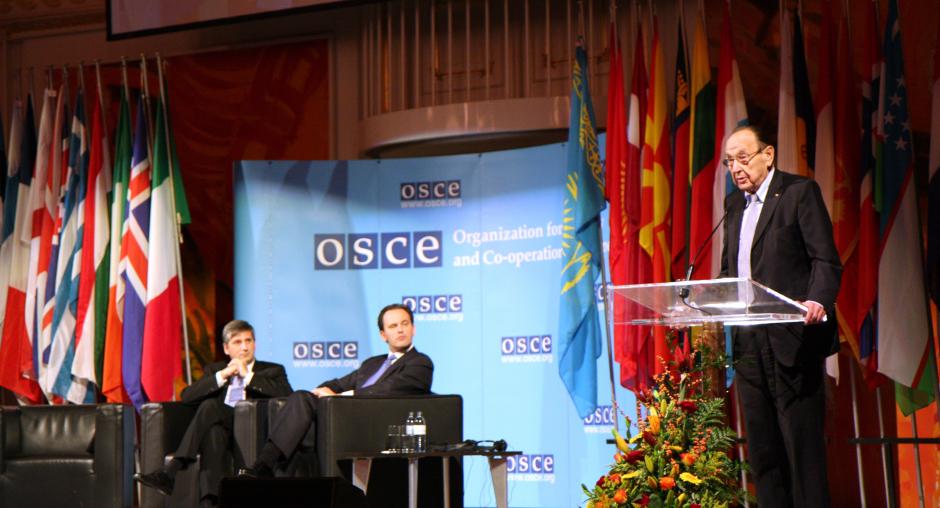Hans-Dietrich Genscher says OSCE a wonderful platform for shaping Europe's future

VIENNA, 6 November 2009 - The task of the OSCE did not come to an end with the fall of the Berlin Wall and the Iron Curtain, and the Organization remains a wonderful platform for shaping the future of Europe, former German Foreign Minister Hans-Dietrich Genscher said today.
Genscher, who served as foreign minister for 18 years, including when the Wall came down on 9 November 1989, addressed more than 600 guests at a special event at Vienna's landmark Hofburg Congress Centre organized jointly by Germany, Greece as the current OSCE Chairmanship, and host country Austria. He said that the building of the Wall was the sign that the battle between the two systems was lost, and that the fall of the Wall led to an erasing of many, but not all, dividing lines all over the world.
Speaking about the role of the OSCE in the process of changing the perceptions and preventing conflicts in Europe, Genscher said: "Many new challenges lie ahead, and joint work in this big organization, in the OSCE, is a wonderful platform for shaping our common future."
The event to mark the 20th anniversary of the fall of the Berlin Wall and the Iron Curtain also featured addresses by Dimitris Droutsas, Greece's Alternate Foreign Minister and Special Envoy of the OSCE Chairman-in-Office, and Austrian Foreign Minister Michael Spindelegger commemorating the anniversary and reflecting on the future of strengthening security in Europe.
"The events of 1989 were the departure point toward a new Europe. The CSCE contributed decisively to this peaceful, historic change through an understanding about common values and through its concept of building trust between East and West," said Spindelegger.
"The inclusive notion of a wider Europe, stretching from Vancouver to Vladivostok, that the OSCE embraces is a unique resource, where 56 countries and their peoples co-operate on common security issues within a framework of shared values. We need this tool today more than ever before," said Droutsas, noting Greece had initiated a Corfu Process of open-ended dialogue for the OSCE to take a frank look at all aspects of the future of European security.
After the speeches and music from the Vienna Chamber Orchestra's string quartet, Droutsas and Genscher gave a news conference and later met a group of students and the winners of a video competition initiated by the German Delegation to the OSCE.
Genscher played a leading role in development of the CSCE - the Conference for Security and Co-operation in Europe - and was West German foreign minister when the Helsinki Final Act was signed in 1975. He later served as the first Chairman-in-Office of the CSCE, which became the OSCE in 1995.
